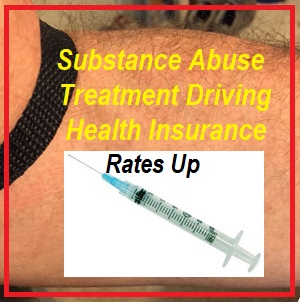
The cost of substance abuse treatment and individuals cancelling health insurance after receiving treatment, drives up health insurance rates for everyone.
One of the most important benefits of Affordable Care Act health plans is coverage for substance abuse treatment. The cost of this expensive treatment is built into the rates for health plans that offer the benefits. But the rates are driven up when consumers enroll in a health plan, get their substance abuse treatment, and then drop the health insurance.
Substance Abuse Treatment Is Expensive
Successful substance abuse treatment can make a family whole again. It can bring back a person addicted to alcohol or narcotics and put them on the path to self-sufficiency and sustainability. The treatment is not cheap. Private pay for some substance abuse programs can range from $5,000 to $20,000 per month and there may be extra costs for special medications.
Health plans don’t pay the retail price for their members. They have negotiated rates. But even if the negotiated rate is 50% of the private pay cost, the expense to the health plan is still substantial. Not all substance abuse facilities accept health insurance. There are a number of treatment facilities that take private health insurance, but don’t participate in Medi-Cal. In general, the nicer facilities can’t supply the level of care they want to provide on the lower Medi-Cal reimbursement rates.
In order to be admitted to the nicer substance abuse treatment facilities an individual needs a private health plan, purchased directly from the insurance company or through Covered California. A Platinum plan that limits an individual’s out-of-pocket cost to $3,350 (2018 benefit year) and will cost a 25-year-old in Los Angeles between $325 and $610 per month with no monthly subsidy.
The health plans build the cost of the substance abuse treatment facilities into their rates based on past claims experience. Another factor is that the carriers make a modest forecast that people will remain in their health plan for the full 12 months if the consumer enrolls at the beginning of the year. At open enrollment, regardless of a individual’s health challenges or addictions, a person can enroll in any health plan they want and the health plan must accept the enrollment.
People Cancel Health Insurance After Treatment
The problem I have experienced is people enrolling in health insurance during the fall, getting their substance abuse treatment covered during the winter, and then having the consumer cancel the health plan in the spring. If a 25-year-old purchased in a Platinum plan for $610 per month, and had maximum out-of-pocket of $3,350, and cancelled the health plan in March, after three months, they had a total maximum cost of $5,180 for the health plan. If they obtained substance abuser treatment during those three months, the health plan may have paid claims upwards of $15,000.
Even if the consumer remained enrolled in the health plan all year, their premiums would never equal the claims paid. But this situation happens all the time. The foundation to keeping health insurance rates low is that people continue to stay enrolled in health insurance even in those years where they have no claims.
People gaming the guarantee issue nature of health insurance since the ACA was rolled out in 2014 has been a problem for carriers. People sign up for health insurance in December during open enrollment, get their surgeries in January, and drop the plan in February. This is unethical, but it doesn’t seem to bother many of those people who do it.
I know there are thousands of people who hate the health insurance industry and most have very valid reasons for their enmity. In these cases of substance abuse treatment, and many other claims, the health plan worked exactly as stated. The consumer entered into a contract with the health plan that as long as the consumer paid their premiums the health plan would pay approved claims. The health plans held up their end of the contractual agreement.
The underlying assumption is that honest and ethical people will continue to pay their premiums even after their health care challenge has passed. But these people who cancel the health plan after treatment don’t value health insurance and don’t understand the financial structure necessary to keep the rates low for everyone. Their actions of terminating health insurance after they have received their expensive health care services are driving up the rates for everyone. The other problem is that friends or family may be paying the premiums so there is an incentive to terminate the plan as soon as possible.
Health Insurance Should Not Cover Drug Abuse Treatment
From my perspective, I don’t think most intensive in-patient or out-patient substance abuse treatment should be a covered benefit of health insurance. This costly treatment needs to have a separate government funding source. High quality substance abuse treatment needs to be available to all residents, not just those with health insurance. People addicted to drugs can often relapse and may need support for months and years. This sort of treatment and support can’t always be supplied by health insurance in a continuous situation over several years. And as I have pointed out, covering this treatment is expensive and the recipients have a higher rate of dropping the health plan after they have concluded their treatment plan.
Substance abuse treatment is a vital health care service that is expensive but necessary to keep individuals and communities from completely dissolving into nothing. We need a separate funding source for high quality substance abuse treatment outside of health insurance. It needs to be taken out of health insurance plans all together in order to keep the rates low for everyone. Substance abuse treatment, as a covered benefit in health insurance, will continue to drive up rates which means fewer people will enroll in health insurance and the whole market begins to unravel.